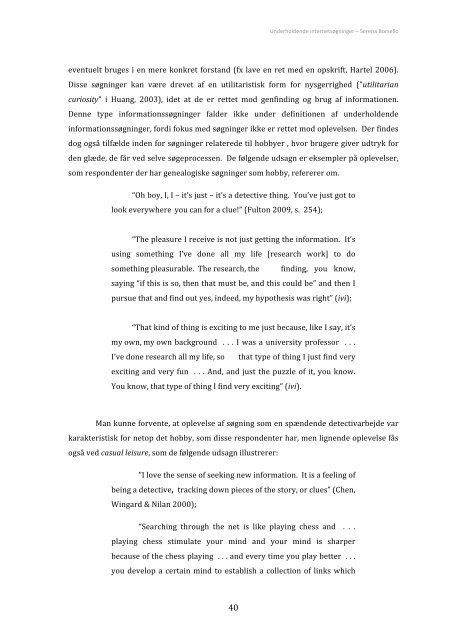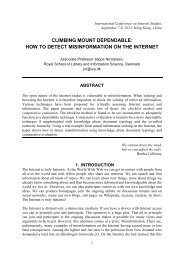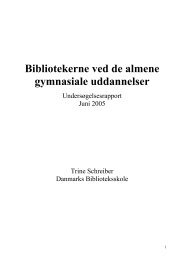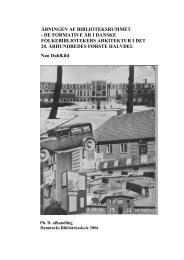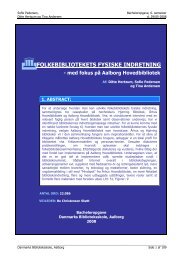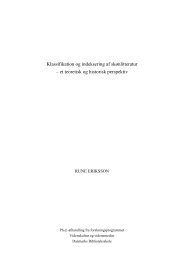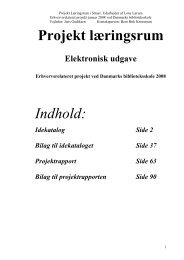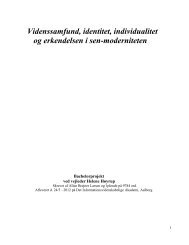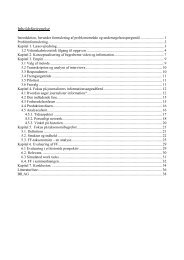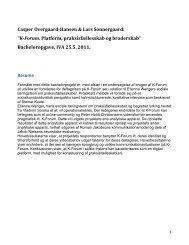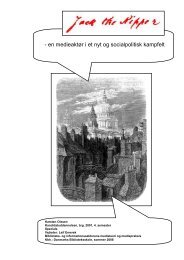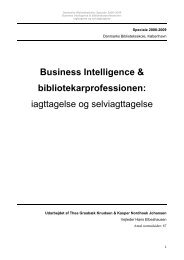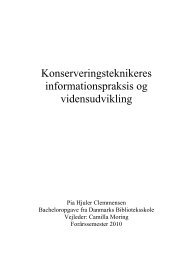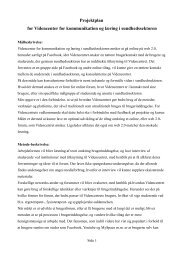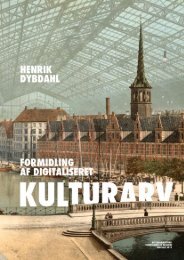Hvorfor er det sjovt at surfe på nettet? - Forskning
Hvorfor er det sjovt at surfe på nettet? - Forskning
Hvorfor er det sjovt at surfe på nettet? - Forskning
You also want an ePaper? Increase the reach of your titles
YUMPU automatically turns print PDFs into web optimized ePapers that Google loves.
40<br />
Und<strong>er</strong>holdende int<strong>er</strong>netsøgning<strong>er</strong> – S<strong>er</strong>ena Borsello<br />
eventuelt bruges i en m<strong>er</strong>e konkret forstand (fx lave en ret med en opskrift, Hartel 2006).<br />
Disse søgning<strong>er</strong> kan være drevet af en utilitaristisk form for nysg<strong>er</strong>righed (”utilitarian<br />
curiosity” i Huang, 2003), i<strong>det</strong> <strong>at</strong> de <strong>er</strong> rettet mod genfinding og brug af inform<strong>at</strong>ionen.<br />
Denne type inform<strong>at</strong>ionssøgning<strong>er</strong> fald<strong>er</strong> ikke und<strong>er</strong> definitionen af und<strong>er</strong>holdende<br />
inform<strong>at</strong>ionssøgning<strong>er</strong>, fordi fokus med søgning<strong>er</strong> ikke <strong>er</strong> rettet mod oplevelsen. D<strong>er</strong> findes<br />
dog også tilfælde inden for søgning<strong>er</strong> rel<strong>at</strong><strong>er</strong>ede til hobby<strong>er</strong> , hvor brug<strong>er</strong>e giv<strong>er</strong> udtryk for<br />
den glæde, de får ved selve søgeprocessen. De følgende udsagn <strong>er</strong> eksempl<strong>er</strong> <strong>på</strong> oplevels<strong>er</strong>,<br />
som respondent<strong>er</strong> d<strong>er</strong> har genealogiske søgning<strong>er</strong> som hobby, ref<strong>er</strong><strong>er</strong><strong>er</strong> om.<br />
“Oh boy, I, I – it’s just – it’s a <strong>det</strong>ective thing. You’ve just got to<br />
look ev<strong>er</strong>ywh<strong>er</strong>e you can for a clue!” (Fulton 2009, s. 254);<br />
“The pleasure I receive is not just getting the inform<strong>at</strong>ion. It’s<br />
using something I’ve done all my life [research work] to do<br />
something pleasurable. The research, the finding, you know,<br />
saying “if this is so, then th<strong>at</strong> must be, and this could be” and then I<br />
pursue th<strong>at</strong> and find out yes, indeed, my hypothesis was right” (ivi);<br />
“Th<strong>at</strong> kind of thing is exciting to me just because, like I say, it’s<br />
my own, my own background . . . I was a univ<strong>er</strong>sity professor . . .<br />
I’ve done research all my life, so th<strong>at</strong> type of thing I just find v<strong>er</strong>y<br />
exciting and v<strong>er</strong>y fun . . . And, and just the puzzle of it, you know.<br />
You know, th<strong>at</strong> type of thing I find v<strong>er</strong>y exciting” (ivi).<br />
Man kunne forvente, <strong>at</strong> oplevelse af søgning som en spændende <strong>det</strong>ectivarbejde var<br />
karakt<strong>er</strong>istisk for netop <strong>det</strong> hobby, som disse respondent<strong>er</strong> har, men lignende oplevelse fås<br />
også ved casual leisure, som de følgende udsagn illustr<strong>er</strong><strong>er</strong>:<br />
”I love the sense of seeking new inform<strong>at</strong>ion. It is a feeling of<br />
being a <strong>det</strong>ective, tracking down pieces of the story, or clues” (Chen,<br />
Wingard & Nilan 2000);<br />
“Searching through the net is like playing chess and . . .<br />
playing chess stimul<strong>at</strong>e your mind and your mind is sharp<strong>er</strong><br />
because of the chess playing . . . and ev<strong>er</strong>y time you play bett<strong>er</strong> . . .<br />
you develop a c<strong>er</strong>tain mind to establish a collection of links which


